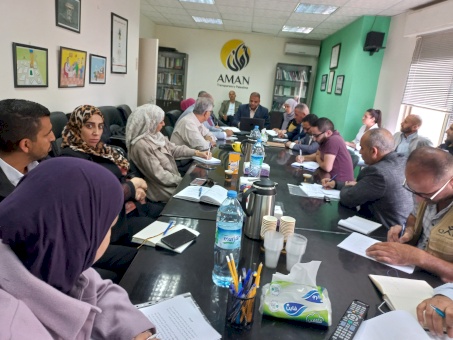
In a session held by the Civil Society Team for Enhancing Public Budget Transparency on governance of the agricultural cooperative sector in Palestine,
Weak concept of governance at cooperatives contributes to a distorted and short-lived idea of cooperative action
Ramallah – The Civil Society Team for Enhancing Public Budget Transparency held a session to discuss a draft Report on Governance of the Agricultural Cooperative Sector in Palestine. The session was attended by representatives of the Cooperative Work Agency (CWA), Ministry of Agriculture, Palestinian Anti-Corruption Commission (PACC), State Audit and Administrative Control Bureau (SAACB), a number of agricultural cooperatives, and agricultural actors.
The report examines the indicators of governance in agricultural cooperative functions and diagnoses current challenges and gaps with a view to promoting the principles of governance and systems of transparency, integrity, and accountability. The report provides practical recommendations that contribute to strengthening governance and immunising the agricultural cooperative sector.
Need to amend the law in partnership with all agricultural actors
The report explains that the concept of governance within cooperatives is inadequate, affecting sustainable functions. As a result, cooperatives go out of business shortly after they are registered. Problems are created by the provisions of the law, as well as by relevant bylaws and regulations, on cooperative activity in Palestine. To this avail, the report recommends that the legislative framework for cooperatives, including agricultural ones, in Palestine be finalised. The Law by Decree No. 20 of 2017 on Cooperative Societies should be amended in partnership with all relevant actors, taking account of the drafts developed already. The law will be enacted along with a legislative package, including bylaws and regulations.
Governance of agricultural cooperatives needs an effective CWA role
The CWA needs to play its official role in monitoring cooperative activity in Palestine. The new CWA Strategy 2021-2023 will be implemented with a view to providing counselling, monitoring, supervision, and control over cooperatives, including those operating in the agriculture sector. The CWA will be supported by logistical, human, and financial resources to help it implement tasks assigned by law. In particular, a significant portion of cases relating to the governance of agricultural cooperatives requires legal and field follow up by the WCA. Within the framework of internal accountability, government bodies will reinvigorate the WCA functions. While public transparent processes are adopted, the values of integrity will be promoted among WCA officials.
Need for concerted official efforts to institutionalise and empower agricultural cooperatives
The report also recommends that agricultural cooperative need to be institutional and empowered through integrated efforts by the government, WCA, civil society organisations, unions, and cooperatives. This should raise awareness of agriculture cooperative managers and staff about the norms of governance and fight against corruption. Having been misrepresented in many ways, the idea of cooperative action will be re-established. Meantime, the guidance manual on governance at agricultural cooperatives will be published. The report further stresses that the government and cooperative unions need to provide protection to agricultural cooperatives, particularly small ones, against risks of financial distress. To this end, production inputs will be protected against manipulation by Israel and private importers. Production outputs will also be protected by facilitating marketing.
WCA: We are in the process of amending a law and bylaw in consistence with the principles of cooperative action
In her comments, Advocate Banan Tantour, Legal Advisor to the WCA, stated that a contemporary law has been drafted. The current law is not in conformity with the principles of cooperative action. Proposed amendments are now under consideration with partners so that relevant provisions are fit within the framework of cooperatives. Work is also underway to compile a code of professional conduct and a comprehensive procedure manual in collaboration with the PACC. In addition to governance, these will cover other administrative, legal, and financial aspects to help cooperatives and provide needed support to their functions.
SAACB refers complaints on cooperatives to the PACC
Mr. Ayman Shaheen, Legal Advisor to the SAACB, asserted that all cooperatives and societies were audited by the SAACB in accordance with the amended 2017 SAACB Law. The Bureau has published more than 40 reports on cooperatives, including agricultural societies. The SAACB has also received complaints on financial and administrative infractions of some cooperatives. Some complaints have been referred to the PACC.
Incorporation of cooperatives is made difficult by absolute centralisation and some confusion within the banking sector
Mr. Jamal Mubaslat, representative of the Economic and Social Development Centre of Palestine, called for holding an expanded meeting with the Palestine Monetary Authority to address the confusion over the registration of, opening of bank accounts, and renewal of financial appropriations for charitable associations and cooperative societies. These issues will be handled in isolation from absolute centralisation and complications.
